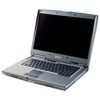Dell Precision M60 Contens: Dell Precision M60 Series Mobile Workstation User' - Page 101
Connecting a Television to the Computer
 |
View all Dell Precision M60 manuals
Add to My Manuals
Save this manual to your list of manuals |
Page 101 highlights
1 Bluetooth card 2 system board connector 3 Bluetooth card connector 4 cable Connecting a Television to the Computer NOTE: Video and audio cables for connecting your computer to a television are not included with your computer. Cables may be purchased at most consumer electronics stores. Your computer has an S-video TV-out connector that, together with the included TV/digital audio adapter cable, enables you to connect the computer to a television and/or stereo audio device. The TV/digital audio adapter cable provides connections for S-video, composite video, and S/PDIF digital audio. 1 S-video TV-out connector 2 TV/digital audio adapter cable 3 S/PDIF digital audio connector 4 composite video connector 5 S-video connector For televisions and audio devices without support for S/PDIF digital audio, you can use the audio connector on the side of the computer to connect the computer to your television or audio device. It is recommended that you connect video and audio cables to your computer in one of the following combinations: NOTE: Diagrams for each connection combination appear at the beginning of each subsection to help you determine which method you should use. l S-video and standard audio l S-video and digital audio l Composite video and standard audio l Composite video and digital audio When you complete the cable connection, see "Enabling the Display Settings for a Television" to ensure that the computer recognizes and works properly with the television. Additionally, if you are using S/PDIF digital audio, see "Enabling S/PDIF Digital Audio."















